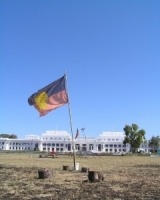Detailed analysis of the 2023 Voice to Parliament Referendum and related social and political attitudes

Abstract
On the 14th of October 2023, Australians voted on a proposal ‘To alter the Constitution to recognise the First Peoples of Australia by establishing an Aboriginal and Torres Strait Islander Voice.’ Only 39.9 per cent of legal votes were in favour of this change, and there was not a majority or close to a majority in any of the six Australian States (there was a majority, however, in the Australian Capital Territory). In order to support an informed discussion about the referendum and its aftermath, the Australian National University collected a detailed survey immediately following the referendum (the October 2023 Australian Constitutional Referendum Study (ACRS)/ANUpoll) from a broadly representative sample of over 4,000 adult Australians. The survey data is available from the Australian Data Archive (doi:10.26193/13NPGQ).
There is no evidence in the data to suggest that Australians are against the idea of constitutional recognition in general. Of those who were willing to give an opinion as to what their vote would have been if the referendum was just about recognition those who would vote yes outnumber those who would vote no by a margin of almost five-to-one. The vote also did not signal a lack of support for reconciliation, for the importance of Aboriginal and Torres Strait Islanders having a voice/say in matters that affect them, truth-telling processes, or for a lack of pride in First Nations cultures. All of these notions were supported in our survey by around eight-in-ten Australians, or even more. We did find, however, that compared to start of the year, Australians are far less satisfied with democracy, less confident in the government, less satisfied with the direction of the country, and less satisfied with their own life.
Our survey data tells us a few things about who was more or less likely to vote yes. No voters were more likely to be male, older, speaking a language other than English at home, with low levels of education, living outside of capital cities, and living in low-income households. Furthermore, a higher proportion of people who didn’t end up voting said that they would have voted yes when asked in August, implying that low turnout suppressed the yes vote.
There were also a number of attitudinal variables that predicted a no vote. Trust in social media, disliking the Prime Minister, thinking that land rights/native title unfair, and thinking that if Indigenous Australians tried harder they could be just as well off as the non-Indigenous population were all associated with voting no in the referendum. Those Australians who were left-of-centre, those who disliked the Opposition Leader, those who trusted the federal government, those who thought that Indigenous people deserve special cultural protection, those that supported reconciliation, and those that thought that land rights/native title had not gone far enough were all more likely to vote yes.
The data suggests that Australians voted no because they didn’t want division and remain sceptical of rights for some Australians that are not held by others. The data suggests that Australians think that Aboriginal and Torres Strait Islander Australians continue to suffer levels of disadvantage that is both caused by past government policies and that justified extra government assistance. They did not see the Voice model put to them as the right approach to remedy that disadvantage.








